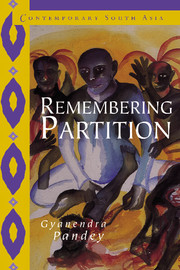Book contents
- Frontmatter
- Contents
- Acknowledgments
- List of abbreviations
- 1 By way of introduction
- 2 The three partitions of 1947
- 3 Historians' history
- 4 The evidence of the historian
- 5 Folding the local into the national: Garhmukhteshwar, November 1946
- 6 Folding the national into the local: Delhi 1947–1948
- 7 Disciplining difference
- 8 Constructing community
- Select bibliography
- Index
6 - Folding the national into the local: Delhi 1947–1948
Published online by Cambridge University Press: 06 January 2010
- Frontmatter
- Contents
- Acknowledgments
- List of abbreviations
- 1 By way of introduction
- 2 The three partitions of 1947
- 3 Historians' history
- 4 The evidence of the historian
- 5 Folding the local into the national: Garhmukhteshwar, November 1946
- 6 Folding the national into the local: Delhi 1947–1948
- 7 Disciplining difference
- 8 Constructing community
- Select bibliography
- Index
Summary
The declared ground for the Partition of British India was that the Muslims of the subcontinent needed a territory, government and state of their own. The logic of this produced the counter-argument that, if that was the case, the Muslims should have no place in what remained as India. Hence the demand articulated in so many quarters that everything be divided into Hindu (or Hindu/Sikh) and Muslim completely and unambiguously – the land, the people, the armed forces, the culture, language and history. Many of the most damaging consequences of 1947 followed from this.
There are moments in history when whole communities come to be refugees, and the members of an entire population (or section of a population, depending on one's point of view) are rendered faceless, undifferentiated, suspect and hunted. This is what happened to the Jews, gypsies and others in Nazi Germany. This is what has happened to the Hututsi in Rwanda, the Serbs in Bosnia and the Albanians in Serbia over the last few years. This is what happened in Delhi and its environs, as of course it did elsewhere in India and Pakistan, for many months in 1947 and afterwards.
Events of this kind work by homogenising and de-classing whole communities. They dehumanise, demonise and de-sex them too, and I say this in spite of the evidence of special atrocities against women that we have noticed in the previous chapters and will encounter again in later ones.
- Type
- Chapter
- Information
- Remembering PartitionViolence, Nationalism and History in India, pp. 121 - 151Publisher: Cambridge University PressPrint publication year: 2001
- 1
- Cited by



